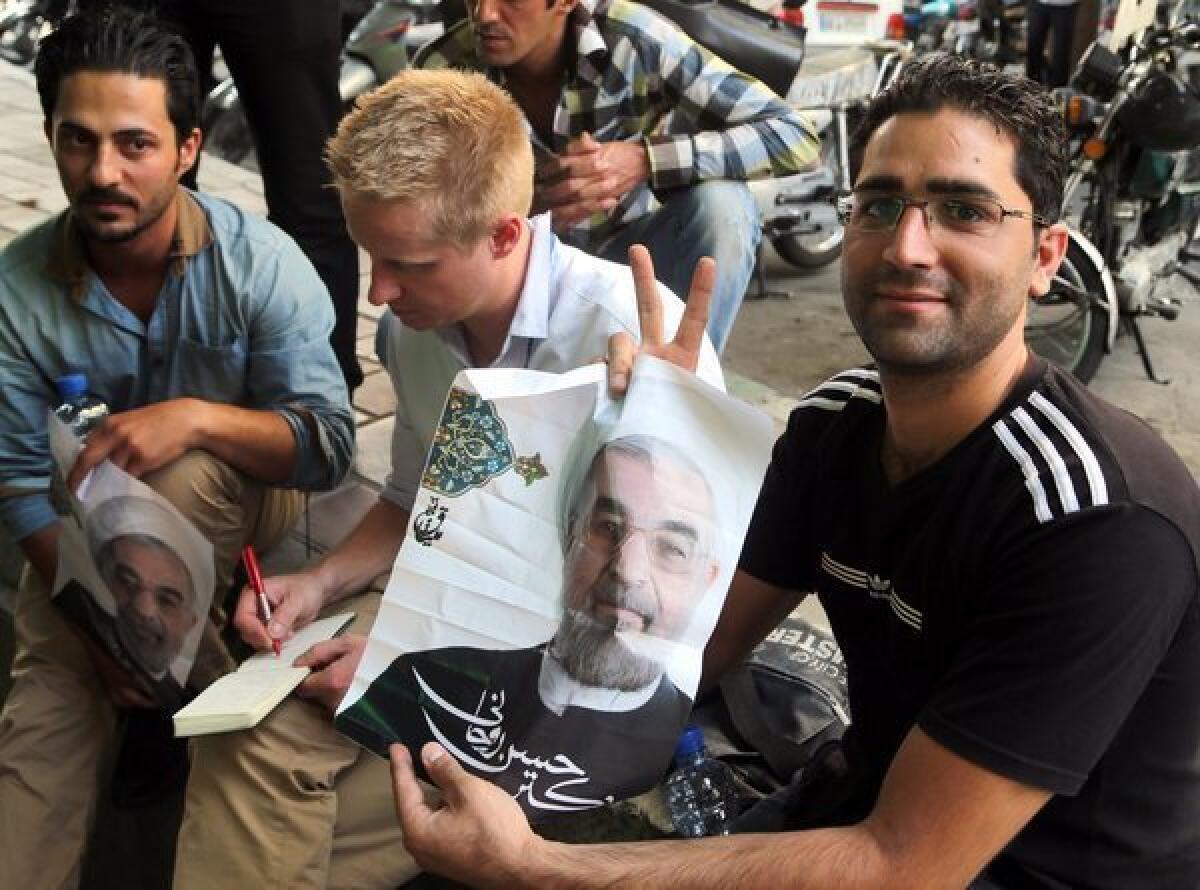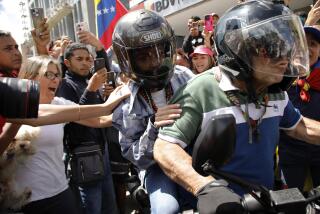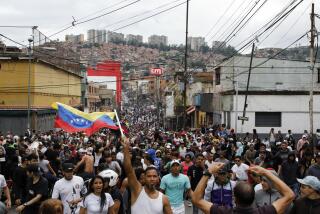Rowhani appears headed to landslide win in Iran elections

- Share via
TEHRAN — Hassan Rowhani, a cleric embraced by reformists and moderates as an alternative to the nation’s hard-line leadership, appeared headed toward a landslide victory Saturday in elections to succeed Iranian President Mahmoud Ahmadinejad.
Rowhani, 64, a bespectacled, bearded jurist who has long been a member of the inner power circle of the Islamic Republic, was winning about 51% of the popular vote with slightly more than half of the projected ballots counted, the Interior Ministry reported Saturday. The count from Friday’s elections continued into Saturday afternoon.
As officials tallied the results, it was still not clear if Rowhani would maintain his commanding lead and avoid a runoff election next week against the second-place finisher. Under Iranian election law, a candidate needs a simple majority to avoid a runoff.
Running a distant second was a conservative office seeker, Tehran Mayor Mohammed Baqer Qalibaf, a former Revolutionary Guard commander and police chief who was garnering about 15% of the vote.
Rowhani’s apparent margin of victory was a huge surprise, reflecting several factors, including a tactically adept campaign and a fractured alliance among his hard-line opponents. Many observers had assumed that one of his conservative rivals would likely emerge victorious, or at least make it into a runoff election. But instead the conservative vote was split, analysts said, opening the way for Rowhani to pull away from the pack.
Only a week ago, Rowhani had been considered a long shot to make it into a runoff election. But he received the endorsement of a pair of former presidents, and a potential rival for reformist votes dropped out of the race, consolidating his prospective support.
Even Rowhani’s inner circle did not predict an outright victory, though his campaign had been polling well in recent days and advisers noted a sense of momentum. Enthusiasm was especially strong among the young, women and middle-class urban voters disillusioned with the nation’s conservative leadership and the stalled economy. Rowhani also did well in voting from the seminary city of Qom, the nation’s religious hub, results showed.
Though long regarded as a conservative-leaning cleric, Rowhani emerged in the last week of the campaign
as a charismatic champion of reformist ideals, including enhanced personal freedoms, gender equality and artistic liberty. He also backed using foreign policy as a means to improve the nation’s free-falling economy, battered by Western-led sanctions tied to the nation’s controversial nuclear program.
Improving the moribund economy was the major theme of all six candidates.
Results were trickling out slowly on Saturday, stretching out the anticipated drama for tens of millions of Iranians who came out in force to vote on Friday, election day. But several hundred youths were said to be gathered outside Rowhani’s campaign headquarters in the capital. There was some speculation that
authorities were seeking to hold off mass street celebrations.
The six candidates had issued a joint statement asking their supporters to refrain from celebration until after the official results were announced.
The official media reported that turnout in Friday’s vote may have topped 80%, exceeding projections that 60% of the 50 million eligible voters would cast ballots.
Long lines at balloting places prompted election authorities to extend voting hours by five hours in Tehran, until 11 p.m. on Friday.
Supporters of Rowhani had expressed confidence that he would post a strong showing, though never predicting a landslide triumph. Rowhani has gone from a dark-horse hopeful to a possible finalist and unexpected standard-bearer of the long-disillusioned reformist camp.
“If he can bring a bit more freedom of speech, more freedom of the press and more space to criticize officials, that’s enough,” said one Rowhani backer, Ali, a physician who would not give his last name.
Among the first to cast a ballot early Friday was the country’s supreme leader, Ayatollah Ali Khamenei, who urged all Iranians to exercise their right to vote. He also told Washington “to hell with you” after some U.S. officials questioned the transparency of the election.
Khamenei has the last say on matters of state in Iran’s theocratic system. But Rowhani has long had close relations with Khamenei, observers said.
The government here views elections as key to its international credibility and had urged a large turnout as a rebuff to Iran’s enemies, principally the United States and its allies. Tehran has accused Washington of seeking to deflate voter participation, a charge denied by the State Department.
Along with choosing a president, Iranians voted for representatives for thousands of city and village council slots. State news media called the election the largest in Iran’s history.
Friday’s presidential elections were the first since the disputed vote in 2009, which was marred by allegations of vote rigging that triggered mass protests and a forceful police crackdown. Critics contended that reformist candidates were robbed of victory in 2009. Ahmadinejad won a second and final term; he was barred by term limits from seeking a third mandate this year, however.
There were three pro-government “principalist” hard-liners on the presidential ballot: Saeed Jalili, the nation’s longtime international nuclear negotiator; former Foreign Minister Ali Akbar Velayati; and Qalibaf. Early returns showed Jalili, viewed as the favored candidate of the nation’s security and clerical establishment, as running fourth, a surprisingly poor showing for someone who was once the presumed front-runner.
Rounding out the slate were two independent conservative candidates: Mohsen Rezai, a former Revolutionary Guard commander, and Mohammad Gharazi, a former oil minister and telecommunications chief.
Mostaghim is a special correspondent. Special correspondent Alexandra Sandels and Times staff
writer McDonnell contributed from Beirut.
More to Read
Sign up for Essential California
The most important California stories and recommendations in your inbox every morning.
You may occasionally receive promotional content from the Los Angeles Times.













